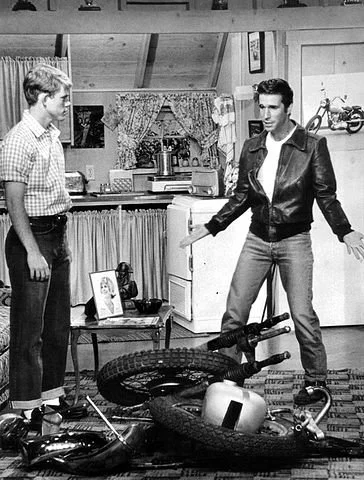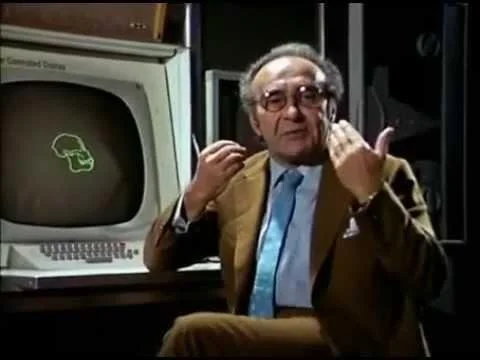TV’s Smart and Shining Series
OMO RIVER VALLEY, ETHIOPIA — SUMMER 1970 — A small, twin-engine plane takes off from a dirt runway in Africa’s Great Rift Valley. Within seconds, engines sputter and the plane goes down. Both pilot and passenger somehow survive to crawl out of the wreckage. But “The Ascent of Man” is off to an ominous start. Even its upbeat host is shaken.
“Here was I preparing to unfold the pageant of the past,” Jacob Bronowski said, “and the present quietly put its hand through the printed page of history and said, ‘It is here. It is now.’”
Five years later, on a quiet Tuesday evening in January, “The Ascent of Man,” already a sensation in England, comes to America. As Fonzie riffs on ABC’s “Happy Days,” over on PBS the camera focuses on a lone man atop a mountain in Africa. Cut to voiceover. . .
“Man is a singular creature. He has a set of gifts which make him unique among the animals: so that, unlike them, he is not a figure in the landscape – he is a shaper of the landscape.“
Though “The Ascent of Man” is unknown to younger audiences, barely remembered by older folks, the series still makes critics swoon. This was on TV? The “vast wasteland?”
In 13 episodes, Dr. Jacob Bronowski guides and charms audiences through a “personal history” of science. Episodes focus on architecture (“The Grain in the Stone”), agriculture (“The Harvest of the Season”), chemistry (“The Hidden Structure”), math (“Music of the Spheres”) plus genetics, physics, evolution and more.
What might have been borr-ing was made compelling by remarkable imagery and on location shoots. Here is Bronowski on Easter Island, here at Maccu Piccu, Canyon de Chelley, the Watts Towers, cave paintings, the Alhambra, the Reims Cathedral. . . Stepping slowly before the camera, thinking, pausing, he seems what geneticist Richard Dawkins called him — “The last Renaissance man.”
Jacob Bronowski, whom everyone called “Bruno,” came to England in 1920. He was 12-years-old. He spoke only Polish. A math prodigy, he won a scholarship to Cambridge and took a Ph.D there in 1935. He taught math, then worked for the British military. But a post-war trip to the ashes of Hiroshima profoundly disturbed his faith in humanity and brought out his poetic side.
Bronowski found solace in the spiritual verse of William Blake, about whom he had written two books to contrast his several on the philosophy of science. So when, in 1969, the BBC’s David Attenborough needed a host for a science series to counter the network’s art-based “Civilization,” he called on Jacob Bronowski. “He told stories marvelously,” Attenborough recalled, “and he had a grasp of narrative timing which was comparable to that of a really great actor.”
In July 1969, as astronauts were about to land on the moon, Bronowski began writing. He started with a title and a vision.
“Man is the only one who is not locked into his environment. His imagination, his reason, his emotional subtlety and toughness, make it possible for him not to accept the environment but to change it. And that series of inventions, by which man from age to age has remade his environment, is a different kind of evolution – not biological, but cultural evolution. I call that brilliant sequence of cultural peaks ‘The Ascent of Man.’”
The title, a spinoff of Darwin’s “Descent of Man,” seems hopelessly dated. Decades onward, critics have called Bronowski Eurocentric, dismissive of native cultures, and overtly sexist. ”Not even Marie Curie breaks into the pantheon.” Fair enough, but stay tuned. Because if you can forgive an old teacher his “personal” biases, Bronowski is the best teacher television ever presented.
The New York Times: “His speech slightly accented, his nonscripted narration dotted with awkward pauses, his delivery ranging from hushed awe to trembling passion — it is a fascinating, thoroughly convincing, delightfully seductive performance.”
Those who remember the series will never forget Bronowski’s visit to Auschwitz. Wrapping up “Knowledge or Certainty,” an episode on the dangerous quest for absolute truth, he ad-libbed an ending that — well, just watch. . .
In the summer of 1973, when “The Ascent of Man” aired on the BBC, British critics instantly recognized its genius. “A landmark in television." “Lavishly produced and visually stunning." The series’ producer went on to make Carl Sagan’s “Cosmos” and other intellectual fare. But Jacob Bronowski had said his final word. Six months before “The Ascent of Man” debuted in America, he died of a heart attack.
In the series final episode, Bronowski returns to where he started — “the cradle of the world,” Africa’s Great Rift Valley. He recounts the plane crash on that first day. While waiting for a new plane, he had asked the pilot if he might want someone else to do the shoot.
“I’ve thought of that,” the pilot replied. “I’m going to be afraid when I go up tomorrow, but I’m going to do the filming. It’s what I have to do.’”
“We are all afraid,” Bronowski concludes, “for our confidence, for the future, for the world. That is the nature of the human imagination. Yet every man, every civilisation, has gone forward because of its engagement with what it has set itself to do. The personal commitment of a man to his skill, the intellectual commitment and the emotional commitment working together as one, has made the Ascent of Man.“
Dated? Sexist? Overly optimistic? Perhaps. But “The Ascent of Man,” which can be seen in its entirety on Youtube, might have something to teach our doomscrolling age.
“Such a faith in the future, may today ring hollow,” the Museum of TV wrote, “especially given Bronowski’s time-bound blindness to the contributions of women and land-based cultures. Yet it still offers, in the accents of joy and decency, an inspiration that a less optimistic and more authoritarian society needs — perhaps more than ever.“









